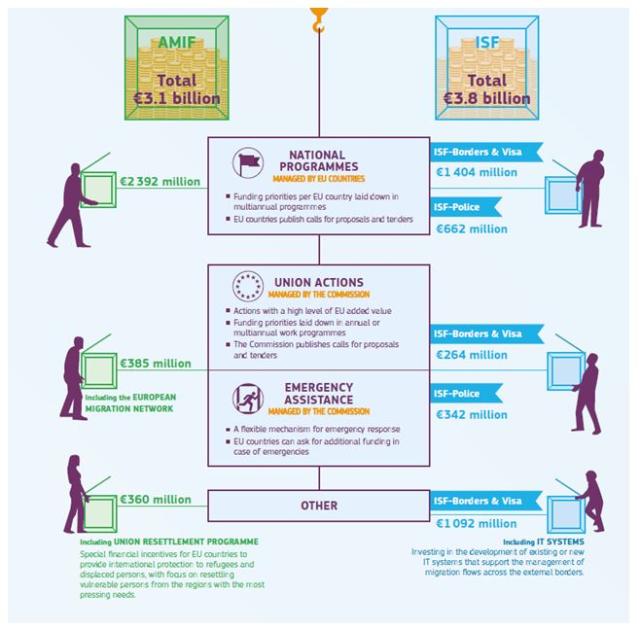EU – Baltic States, Financial Services, Funds, Legislation, Society
International Internet Magazine. Baltic States news & analytics
Saturday, 20.04.2024, 00:58
EU financial instruments for open and secure Europe
 Print version
Print version
The EU efforts in the field of Migration and Home Affairs are supported by the two funds: Asylum, Migration and Integration Fund, AMIF and the Internal Security Fund, ISF.
The Asylum, Migration and Integration Fund contributes to the efficient management of migration flows and the development of a common approach to asylum and migration.
The Internal Security Fund (consisting of the Borders and Visa and the Police cooperation and crisis management instrument) helps ensure a high level of security and crime prevention in the Union, while at the same time enabling legitimate travel and ensuring solid management of the Union's external borders.
About 85% of the Funds are channeled through the national programs: multiannual, strategic documents covering the 2014-20. These programs are prepared, implemented, monitored and evaluated by the responsible authorities in the Member States, in partnership with the relevant stakeholders in the field, including civil society, and approved by the Commission.
The remainder (around 15% of all the resources) is managed by the Commission for which work programs are adopted under the three financial instruments. It is through these Commission work programs that Union Actions and emergency assistance to Member States are funded (See Work Program: AMIF 2014, ISF-B 2014, ISF-P 2014).
Migration, Home Affairs and Citizenship Commissioner Dimitris Avramopoulos underlined that migration obligations, being one of the ten Commission’s priorities, shall be performed by the EU and the member states together. That was the reason behind European Commission’s support to the EU States through the mentioned two funds.
AMIF and ISF programs
For example, the AMIF funding
supports national efforts in order to enhance reception capacities, improve the
quality of asylum procedures in line with the Union standards, integrate
migrants at local and regional levels and increase the sustainability of return
programs.
The ISF program supports national efforts to improve EU states' border management (in particular through the use of interoperable modern technologies), improve cross-border law enforcement cooperation and strengthen member states' capacity to effectively manage security-related risks such as terrorism and violent radicalisation, drug trafficking, cybercrime and cyber security, trafficking in human beings, and other forms of organised crime.
In addition to the basic allocation (explained below), most of the programs approved by the Commission at the end of March 2015, benefit from additional amounts made available to some EU states, which volunteered for the implementation of specific actions with a strong transnational dimension such as joint return and reintegration projects under the AMIF or the setting up of consular cooperation under the ISF.
Additional funding under some of the ISF programs will also be invested in the purchase of large scale equipment, which will be put at the disposal of Frontex joint operations whenever needed. Almost €100 million channeled through the AMIF programs will be used to support the Union Resettlement Program in the period 2014-15.
The Commission is working towards the swift approval of the remaining national programs. With a total budget of almost €7 billion for the period 2014-20 for AMIF and ISF, these Funds are the principal EU financial instruments for investing in an open and secure Europe.
Presently 22 national programs have now been approved by the Commission (under shared management): 17 AMIF programs (Austria, Belgium, Bulgaria, Czech Republic, Germany, Estonia, Finland, France, Hungary, Lithuania, Luxemburg, Malta, The Netherlands, Portugal, Romania, Slovenia and the United Kingdom) and 5 ISF programs (Belgium, Czech Republic, Germany, Denmark, France). An additional 36 national programs will be approved later in 2015.
More information on:
= Directorate General for Migration and Home Affairs Website website;
= Website of First Vice-President Frans Timmermans;
= Website of Commissioner Dimitris Avramopoulos;
= Infographic – Home Affairs Funds
1. The AMIF and ISF Funds explained

2. Financial allocations per Member State
|
Member State |
Basic allocations |
Specific Actions |
Resettlement |
TOTAL |
||
|
AMIF |
ISF Borders |
ISF Police |
||||
|
Austria (AMIF) |
64,533,977 |
|
|
|
6,000,000 |
70,533,977 |
|
Belgium (AMIF) |
89,250,977 |
|
|
5,013,765.12 |
4,000,000 |
98,264,742.12 |
|
Belgium (ISF) |
|
17,519,321 |
17,903,270 |
3,798,000 |
|
39,220,591 |
|
Bulgaria (AMIF) |
10,006,777 |
|
|
|
|
10,006,777 |
|
Czech Republic (AMIF) |
26,185,177 |
|
|
|
1,500,000 |
27,685,177 |
|
Czech Republic (ISF) |
|
14,381,484 |
17,029,012 |
774,000 |
|
32,184,496 |
|
Germany (AMIF) |
208,416,877 |
|
|
|
13,000,000 |
221,418,877 |
|
Germany (ISF) |
|
51,753,437 |
79,504,401 |
3,195,000 |
|
134,452,838 |
|
Denmark (ISF) |
10,322,133 |
|
|
10,322,133 |
||
|
Estonia (AMIF) |
10,156,577 |
|
|
|
|
10,156,577 |
|
Finland (AMIF) |
23,488,777 |
|
|
|
20,650,000 |
44,138,777 |
|
France (AMIF) |
265,565,577 |
|
|
2,295,000 |
18,730,000 |
286,590,577 |
|
France (ISF) |
|
84,999,342 |
70,114,640 |
22,050,000 |
|
177,163,942 |
|
Hungary (AMIF) |
23,713,477 |
|
|
|
400,000 |
24,113,477 |
|
Lithuania (AMIF) |
9,632,277 |
|
|
|
|
9,632,277 |
|
Luxembourg (AMIF) |
7,160,577 |
|
|
|
800,000 |
7,960,577 |
|
Malta (AMIF) |
17,178,877 |
|
|
|
|
17,178,877 |
|
Netherlands (AMIF) |
94,419,077 |
|
|
26,750,000 |
9,860,000 |
131,029,077 |
|
Portugal (AMIF) |
32,776,377 |
|
|
|
1,080,000 |
33,856,377 |
|
Romania (AMIF) |
21,915,877 |
|
|
1,935,000 |
580,000 |
24,430,877 |
|
Slovenia (AMIF) |
14,725,477 |
|
|
|
|
14,725,477 |
|
United Kingdom (AMIF) |
370,425,577 |
|
22,200,000 |
392,625,577 |
||
Reference: http://europa.eu/rapid/press-release_IP-15-4662_en.htm








 «The Baltic Course» Is Sold and Stays in Business!
«The Baltic Course» Is Sold and Stays in Business!

